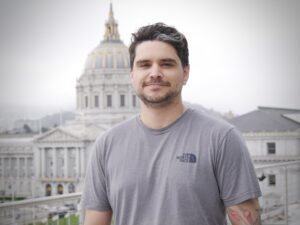1L Sean Stone Works to Address Injustices for Detroit Residents and Prevent Homelessness

Working with an affordable housing advocacy group in Detroit, 1L Sean Stone helped expose exploitative land contracts and other practices that unfairly disadvantage vulnerable residents.
Working with the United Community Housing Coalition in Detroit, 1L Sean Stone analyzed contracts and examined factors that exacerbate homelessness and diminish housing affordability.
- Worked with the United Community Housing Coalition in Detroit to prevent homelessness and promote affordable housing during Alternative Spring Break.
- Researched patterns and systems that harm low-income residents and helped clients reclaim money they were owed.
- Gained experience in housing law and policy—areas he’s interested in pursuing as a career.
1L Sean Stone:
I went to Detroit for my Alternative Spring Break (ASB) and worked with the United Community Housing Coalition (UCHC), an organization dedicated to preventing homelessness and promoting affordable housing.
Our team focused on land contracts that were going through the court-ordered eviction processes. This involved analyzing hundreds of contracts to determine the average amount of payment remaining on these properties, which was sometimes as low as $1,000.
Our work revealed a troubling pattern: Many residents had paid off most of their contracts over a number of years, only to face eviction after missing one or two payments due to financial hardship, losing all accumulated equity in the process.
We supported a UCHC program that purchases these contracts (either through direct negotiation or foreclosure auctions) and then works with the evicted individuals to issue zero-interest loans that allow them to complete their payments.
Additionally, we connected with recently evicted homeowners whose houses were sold at government auctions. In many cases, these auctions brought in more money than was owed in back taxes. The government is legally required to return the difference to the former residents but often failed to notify them. Working alongside a local investigative newspaper, we helped UCHC assist the individuals in reclaiming their money.
We also contributed to research tracking the emerging cryptocurrency speculation market in Detroit real estate. There are many companies that appear to be shell corporations operating in a circular system. We tracked patterns where one corporation would fail to pay property taxes, allowing foreclosure to occur, only for another connected company to purchase it at auction.
Meanwhile, low-income residents of these properties continued paying rent without knowing who their actual landlords were, so they were unable to secure repairs and often lived in uninhabitable conditions. Most concerning was that many residents feared speaking up about these conditions due to worries that if their homes were condemned as unlivable, they might lose their housing assistance with nowhere else to go.
This ASB trip provided valuable on-the-ground experience working with the ongoing effects of the 2008 housing bubble collapse. I witnessed how predatory lending practices have been replaced by other problematic approaches, how government response remains inadequate, and how ordinary Detroit residents bear the consequences. I was encouraged to see nonprofits like UCHC stepping in.
This experience aligns with my interest in housing law and policy, giving me practical exposure to the intersection of property law, contract law, and social justice—areas I’m considering specializing in. The research skills I developed will be invaluable throughout my legal career.
The experience also deepened my understanding of how legal advocates can serve vulnerable populations and strengthened my commitment to using my legal education to address systemic inequities in our housing systems.
The Evidence of Success series highlights UC Law SF students as they share how the college’s opportunities equip them with the experience, skills, and confidence to excel in the legal profession.